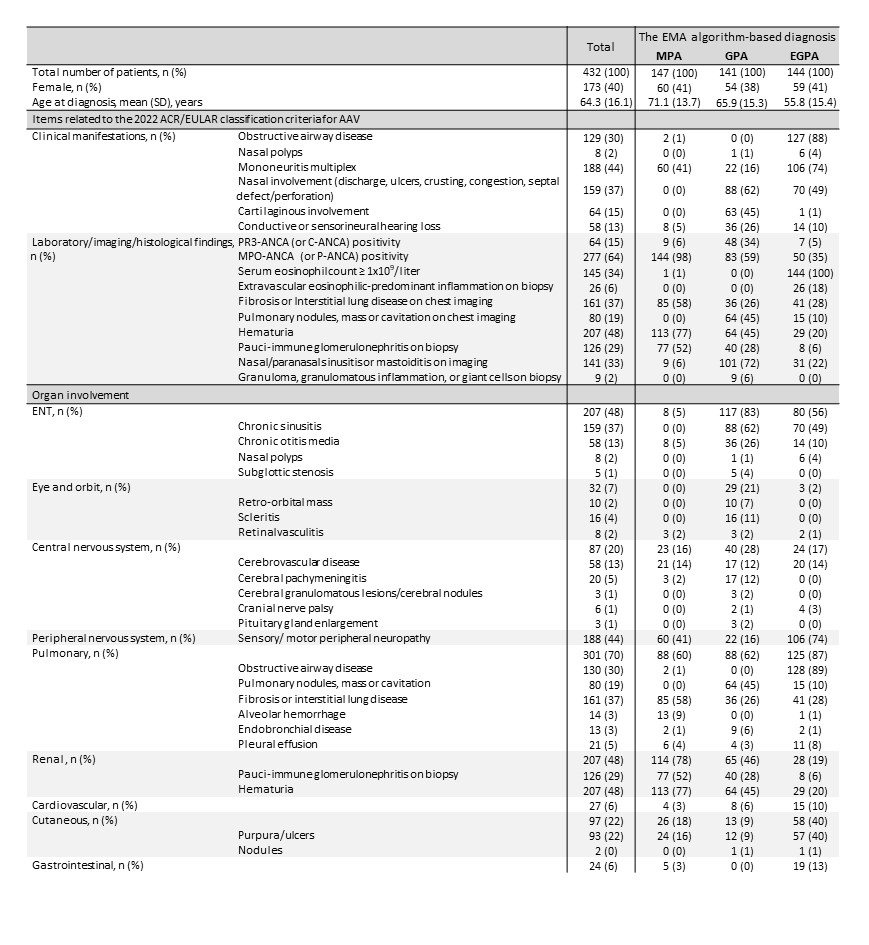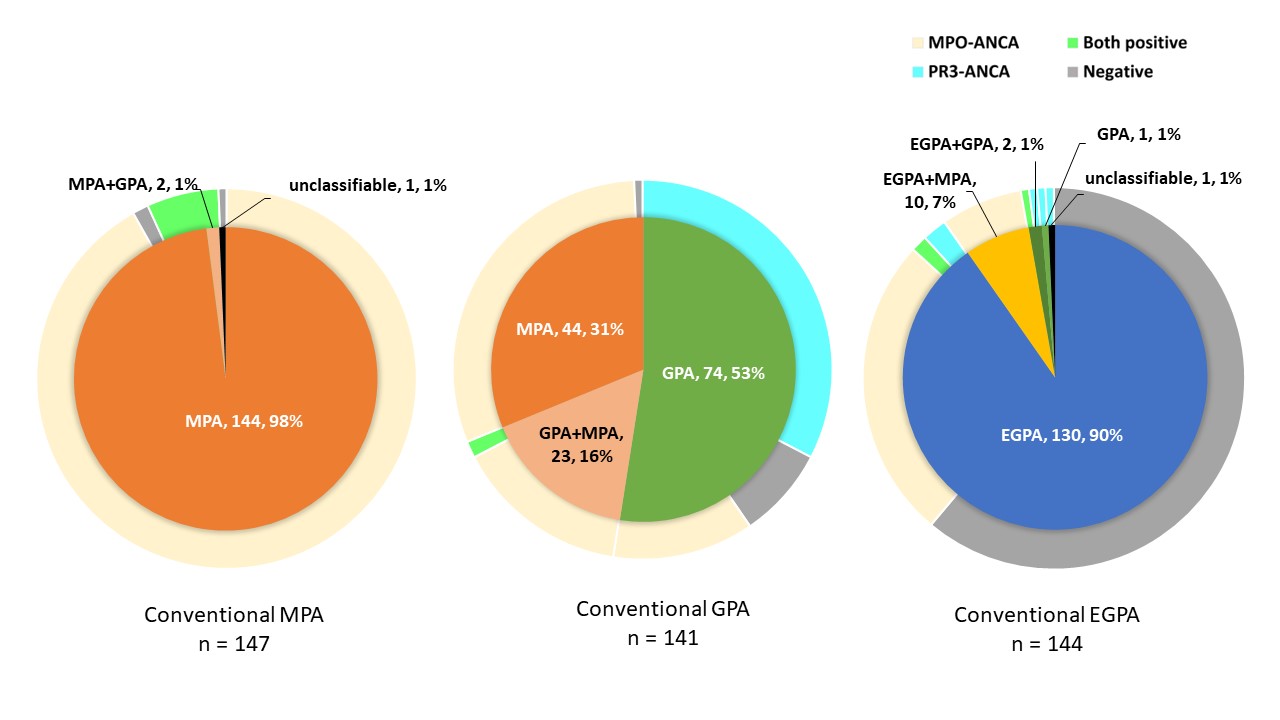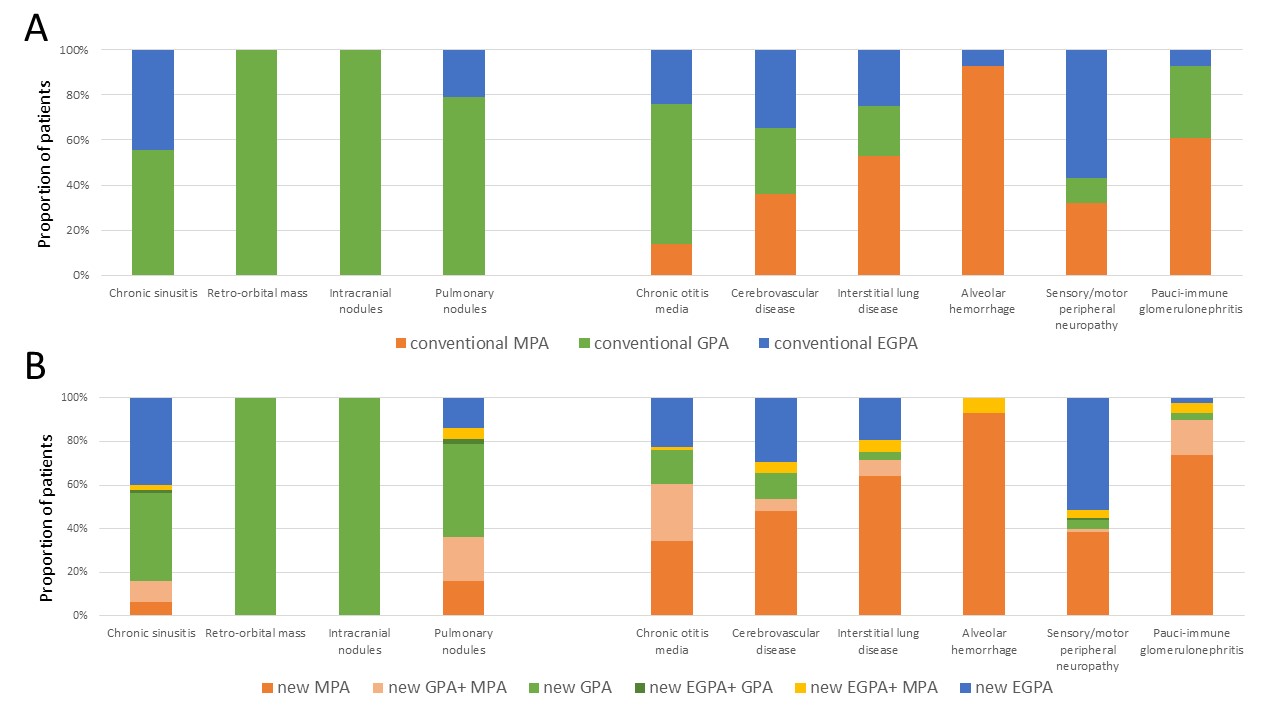Session Information
Date: Monday, November 13, 2023
Title: (1534–1553) Vasculitis – ANCA-Associated Poster II: Epidemiology, Outcomes, & Classification
Session Type: Poster Session B
Session Time: 9:00AM-11:00AM
Background/Purpose: The European Medicines Agency (EMA) algorithm has been widely accepted as a conventional and reliable method to diagnose ANCA-associated vasculitis (AAV). In 2022 the ACR/EULAR endorsed new classification criteria for three clinicopathological subtypes of AAV. Epidemiological studies revealed that MPO-ANCA-positive GPA patients are more common in Asia than in northern Europe and the United States. However, the new criteria assign greater importance to ANCA serology than histology and surrogate markers compared with the conventional method.
This study aimed to evaluate the reliability and validity of the new criteria when targeting AAV patients from an Asian background. The performance of the new criteria was assessed with a focus on the phenotypes of organ involvement, including histology and surrogate markers.
Methods: This study included a total of 432 patients diagnosed with MPA, GPA, and EGPA (147, 141, and 144, respectively) by the conventional method at three medical institutions in Japan between 2000 and 2023 (Table). Only Asians accounted for the whole population. Firstly, the distribution of each AAV subtype was examined before and after reclassification according to the new criteria. Secondly, the difference in the proportion of each AAV subtype per phenotype of organ involvement before and after reclassification.
Results: The patients diagnosed with MPA and EGPA by the conventional method were significantly more likely to be reclassified as the same AAV subtype (146 out of 147 and 142 out of 144 patients [99 % and 98 %], respectively) (Figure 1). On the other hand, the patients diagnosed with GPA by the conventional method were less likely to be reclassified as the same AAV subtype (97 out of 141 patients [69%]). Figure 2 shows the proportion of each AAV subtype per phenotype of organ involvement before and after reclassification. (A and B, respectively). In the conventionally-diagnosed GPA population, those who presented with pulmonary nodules and sinusitis were partially reclassified as MPA, and most of them were MPO-ANCA-positive. Also, those who presented with chronic otitis media and interstitial lung disease were partially reclassified as MPA. However, those who presented with orbital and intracranial nodules were all reclassified as GPA as ever. In the conventionally-diagnosed MPA population, those who presented with alveolar hemorrhage and pauci-immune glomerulonephritis were mostly reclassified as MPA as ever, and most of them were MPO-ANCA-positive. In the conventionally-diagnosed EGPA population, there were almost no significant changes except for two PR3-ANCA-positive patients who were excluded from the diagnosis of EGPA after reclassification.
Conclusion: The 2022 ACR/EULAR criteria were more likely to reclassify MPO-ANCA-positive patients diagnosed with GPA according to the EMA algorithm as MPA even in the presence of findings suggesting granulomatous inflammation, which led to a diagnostic contradiction. However, PR3-ANCA-positive patients diagnosed with GPA by the conventional method were likely to present with recurrent or severe organ involvement, including orbital and intracranial nodules, and the new criteria also reclassified these patients as GPA.
To cite this abstract in AMA style:
Kuwata R, Shirota Y, Shirai T, Yamashita H, Sato H, Oka Y, Kodera T, Motomura K, Kaneko H, Kameoka J, Fujii H, Ishii T. Evaluation of the Validity of the 2022 American College of Rheumatology/European Alliance of Associations for Rheumatology Classification Criteria for Antineutrophil Cytoplasmic Antibody-associated Vasculitis for an Asian Population on the Basis of the Patterns of Organ Involvement [abstract]. Arthritis Rheumatol. 2023; 75 (suppl 9). https://acrabstracts.org/abstract/evaluation-of-the-validity-of-the-2022-american-college-of-rheumatology-european-alliance-of-associations-for-rheumatology-classification-criteria-for-antineutrophil-cytoplasmic-antibody-associated-va/. Accessed .« Back to ACR Convergence 2023
ACR Meeting Abstracts - https://acrabstracts.org/abstract/evaluation-of-the-validity-of-the-2022-american-college-of-rheumatology-european-alliance-of-associations-for-rheumatology-classification-criteria-for-antineutrophil-cytoplasmic-antibody-associated-va/



